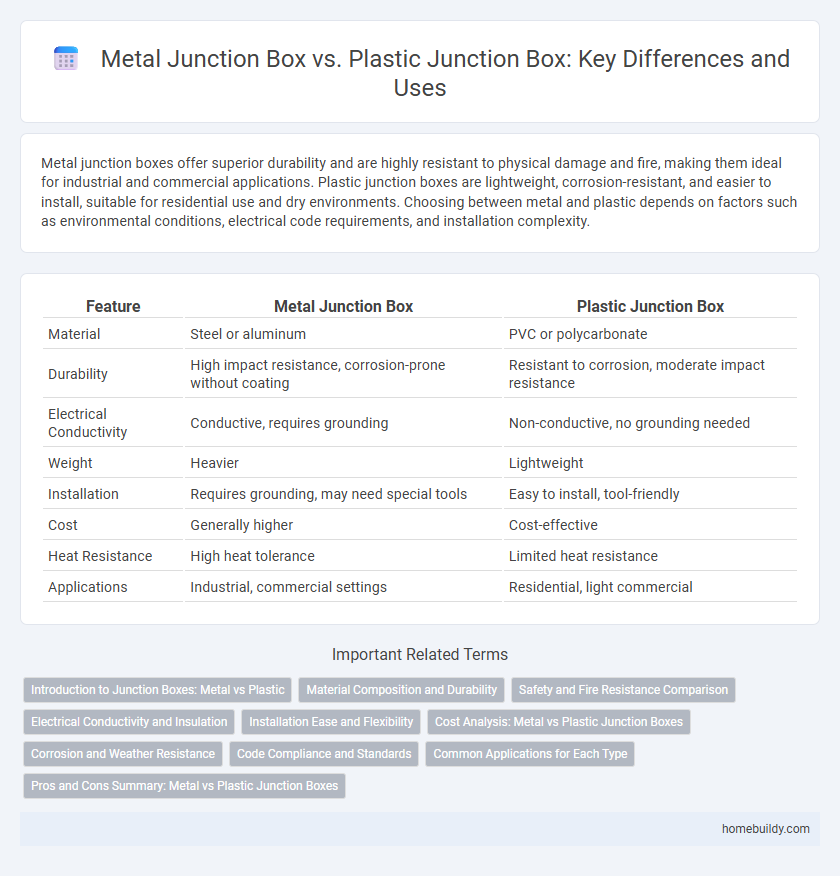Metal junction boxes offer superior durability and are highly resistant to physical damage and fire, making them ideal for industrial and commercial applications. Plastic junction boxes are lightweight, corrosion-resistant, and easier to install, suitable for residential use and dry environments. Choosing between metal and plastic depends on factors such as environmental conditions, electrical code requirements, and installation complexity.
Table of Comparison
| Feature | Metal Junction Box | Plastic Junction Box |
|---|---|---|
| Material | Steel or aluminum | PVC or polycarbonate |
| Durability | High impact resistance, corrosion-prone without coating | Resistant to corrosion, moderate impact resistance |
| Electrical Conductivity | Conductive, requires grounding | Non-conductive, no grounding needed |
| Weight | Heavier | Lightweight |
| Installation | Requires grounding, may need special tools | Easy to install, tool-friendly |
| Cost | Generally higher | Cost-effective |
| Heat Resistance | High heat tolerance | Limited heat resistance |
| Applications | Industrial, commercial settings | Residential, light commercial |
Introduction to Junction Boxes: Metal vs Plastic
Metal junction boxes offer superior durability, heat resistance, and grounding capabilities, making them ideal for industrial and outdoor applications where safety and longevity are critical. Plastic junction boxes provide lightweight, corrosion-resistant, and cost-effective solutions suitable for residential and indoor use, especially in dry environments. Choosing between metal and plastic junction boxes depends on specific project requirements, environmental conditions, and electrical codes.
Material Composition and Durability
Metal junction boxes, typically made from steel or aluminum, offer superior durability and resistance to physical impacts, corrosion, and high temperatures, making them ideal for industrial and outdoor applications. Plastic junction boxes, composed of PVC or polycarbonate, provide excellent insulation, corrosion resistance, and lightweight properties but may degrade under UV exposure and prolonged heat. Choosing between metal and plastic junction boxes depends on environmental conditions and specific safety requirements, with metal favoring robustness and plastic emphasizing electrical insulation and corrosion resistance.
Safety and Fire Resistance Comparison
Metal junction boxes offer superior fire resistance due to their non-combustible nature and higher melting points, providing enhanced protection against electrical fires. Plastic junction boxes, while lightweight and corrosion-resistant, are more prone to melting or burning under high heat, posing increased safety risks in fire-prone environments. Choosing metal junction boxes improves overall electrical safety by reducing the risk of fire damage and ensuring compliance with stringent building codes.
Electrical Conductivity and Insulation
Metal junction boxes offer superior electrical conductivity, which helps in grounding and reducing electrical interference. Plastic junction boxes provide excellent insulation properties, preventing electrical shocks and corrosion risks. Choosing between metal and plastic depends on whether conductivity for grounding or insulation for safety and durability is prioritized in the electrical system.
Installation Ease and Flexibility
Metal junction boxes offer robust durability and superior grounding capabilities but can be heavier and more challenging to install in tight spaces due to their rigid structure. Plastic junction boxes are lightweight, easier to cut or modify on-site, and often come with built-in features like pre-scored knockouts for faster installation and greater flexibility in wiring configurations. Choosing between metal and plastic junction boxes depends on the specific installation environment, with plastic providing easier handling and adaptability while metal ensures enhanced protection and electrical code compliance in demanding conditions.
Cost Analysis: Metal vs Plastic Junction Boxes
Metal junction boxes generally have higher upfront costs due to durable materials and corrosion resistance, making them cost-effective for long-term industrial applications. Plastic junction boxes offer lower initial purchase prices and ease of installation but may incur replacement expenses over time due to lower durability and UV sensitivity. Evaluating total cost of ownership, including maintenance and lifecycle, is crucial when comparing metal versus plastic junction boxes in electrical installations.
Corrosion and Weather Resistance
Metal junction boxes offer superior durability and resistance to physical damage but are prone to corrosion if not properly coated or maintained, especially in humid or marine environments. Plastic junction boxes provide excellent corrosion resistance and weatherproofing, making them ideal for outdoor applications and harsh weather conditions. Choosing between metal and plastic depends on the specific environmental exposure and longevity requirements of the electrical installation.
Code Compliance and Standards
Metal junction boxes typically comply with NEC (National Electrical Code) requirements for grounding and are preferred in commercial and industrial settings due to their durability and fire resistance. Plastic junction boxes must meet UL 514A standards for electrical boxes and are suitable for residential use but require proper grounding methods per NEC Article 300. Both types must adhere to OSHA guidelines and local building codes to ensure safety and code compliance.
Common Applications for Each Type
Metal junction boxes are commonly used in commercial and industrial settings due to their durability and ability to withstand harsh environments, making them ideal for outdoor installations, heavy machinery wiring, and areas requiring electromagnetic shielding. Plastic junction boxes are frequently employed in residential and light commercial applications where moisture resistance and corrosion immunity are priorities, such as indoor wiring, damp locations, and low-voltage circuits. Choosing between metal and plastic junction boxes depends on factors like electrical code requirements, environmental conditions, and the specific demands of the installation site.
Pros and Cons Summary: Metal vs Plastic Junction Boxes
Metal junction boxes offer superior durability, enhanced grounding capabilities, and better fire resistance, making them suitable for industrial and commercial applications. Plastic junction boxes provide lightweight installation, corrosion resistance, and cost-effectiveness, ideal for residential and dry indoor environments. However, plastic boxes may lack grounding benefits and are less robust under extreme conditions compared to metal boxes.
Metal junction box vs Plastic junction box Infographic

 homebuildy.com
homebuildy.com